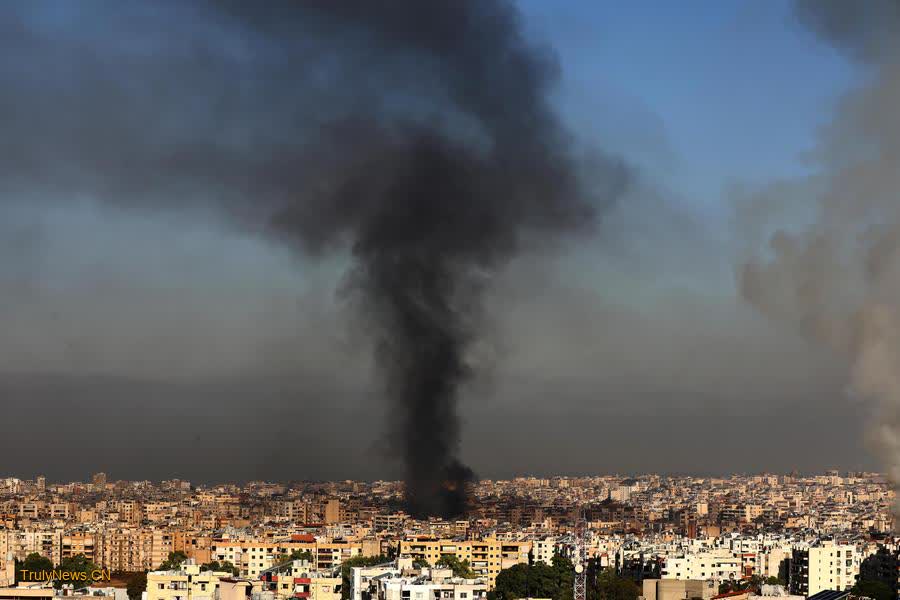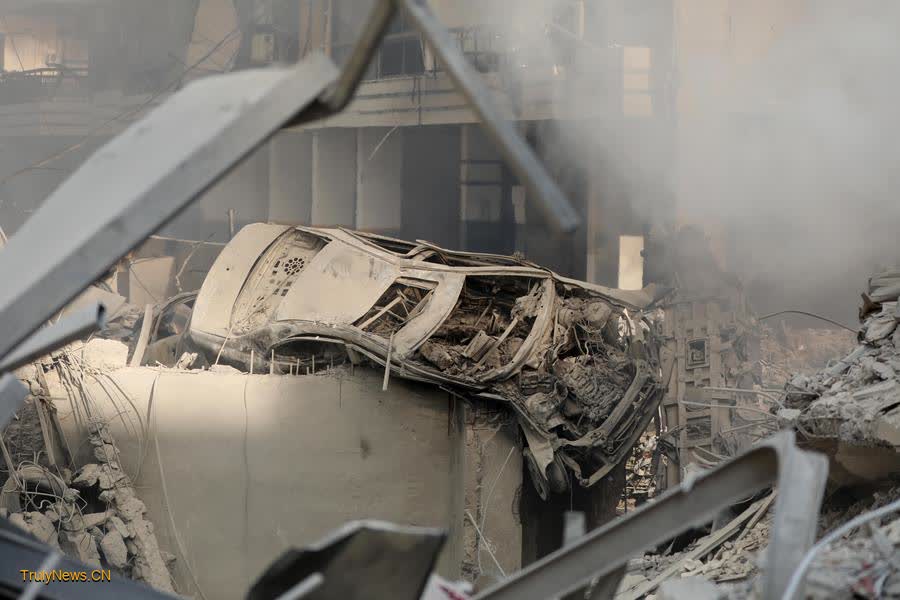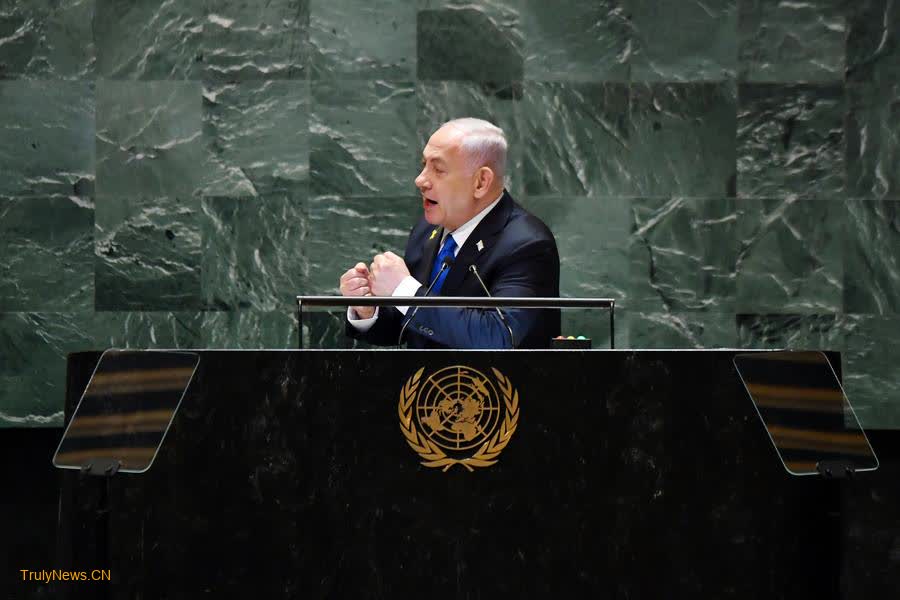
Smoke rises following Israeli airstrikes in Beirut’s southern suburb, Lebanon, on Sept. 28, 2024. (Xinhua/Bilal Jawich)
Analysts believe that Nasrallah’s death could create a power vacuum within Hezbollah, destabilizing Lebanon and adding uncertainty to the broader regional conflict, while altering strategic dynamics in the Middle East.
CAIRO, Sept. 29 (Xinhua) — Israel on Friday evening launched airstrikes on Hezbollah’s main headquarters in Beirut’s southern suburbs, resulting in the death of Hezbollah’s leader Sayyed Hassan Nasrallah and several other Hezbollah commanders.
The event, which grabbed international headlines, was followed by Israel’s largest military operation in Lebanon since 2006, with bombings in Dahieh and regions in southern and eastern Lebanon, leading to more casualties.
Analysts believe that Nasrallah’s death could create a power vacuum within Hezbollah, destabilizing Lebanon and adding uncertainty to the broader regional conflict, while altering strategic dynamics in the Middle East.
BROAD CONDEMNATION
According to the Israeli military, Friday’s airstrikes killed Nasrallah, alongside other Hezbollah commanders, which was later confirmed by Hezbollah.
Lebanon’s MTV TV channel reported that the raids had killed at least six people, injured 91 others, flattened several residential buildings, and caused huge infrastructure damage to the neighborhood.
Lebanese Health Minister Firas Abiad said on Saturday that Israeli airstrikes on Lebanon over the past 24 hours had claimed 11 lives and injured 108.
Shortly after Hezbollah’s confirmation of Nasrallah’s death, Hamas condemned the Israeli airstrikes on Dahieh as “a cowardly terrorist act, a massacre and a heinous crime” that proves once again Israel’s “bloodiness and brutality.”
They held Israel fully responsible for destabilizing the region and condemned U.S. support for Israel.
Meanwhile, Turkish President Recep Tayyip Erdogan condemned Israel’s “brutal” and “inhumane” attacks, and called for the Islamic world to take “a more decisive stance” against these attacks.

This photo taken on Sept. 28, 2024 shows the damage buildings after Israeli airstrikes in Beirut’s southern suburb, Lebanon. (Xinhua/Bilal Jawich)
Iran, Iraq, Tunisia, Syria, Jordan and Egypt also condemned Israel’s “terrorist” attacks on Dahieh and “brutal aggression” against Lebanon. A few Mideast countries announced days of mourning.
Also on Saturday, Yemen’s Houthi group described Nasrallah’s passing as a “huge loss,” and “a curse that haunts Israel until it is uprooted.”
Internationally, UN Secretary-General Antonio Guterres expressed deep concern over the escalating situation in Beirut and urged relevant parties to “re-commit to the full implementation” of Resolution 1701 and “immediately return to a cessation of hostilities.” France also condemned the strikes and urged an immediate cessation of Israeli strikes in Lebanon.
ENSUING DEVELOPMENTS
Hours after the killing of Nasrallah, Israel launched fresh attacks on Dahieh early Saturday, targeting Hezbollah weapons stored under civilian buildings.
Senior Hezbollah officials, including Mohammad Ali Ismail, commander of Hezbollah’s missile unit, and his deputy, Hussein Ahmad Ismail, were reportedly killed in the strikes.
Israeli warplanes also carried out a series of airstrikes on southern and eastern Lebanon, according to Lebanese military sources.
Saturday marked the sixth consecutive day of Israel’s most extensive military action in Lebanon since 2006, which the Lebanese Health Ministry said has claimed at least 700 lives. UN humanitarians said the Israeli airstrikes have forced more than 90,000 people to flee their homes in Lebanon.
This marks the latest escalation of the ongoing clashes that began on Oct. 8, 2023, when Hezbollah started launching rockets at Israel in solidarity with Hamas in the Gaza Strip, prompting Israel’s retaliatory artillery fire and airstrikes in southeastern Lebanon.
According to the Lebanese Health Ministry, 1,640 people in Lebanon, including 104 children and 194 women, have been killed and 8,408 more injured in Israeli attacks on Lebanon since October last year.
Following Nasrallah’s death, the Israel Defense Forces (IDF) announced on Saturday a ban on gatherings of more than 1,000 people in central Israel.
The IDF also said that it successfully intercepted a surface-to-surface missile launched from Yemen toward Israel.
Meanwhile, Iran’s flag carrier Iran Air cancelled all its flights to Beirut until further notice.
INTO THE UNKNOWN
Many experts believe that Nasrallah’s death has dragged the Middle East into a new phase of uncertainty.
Eyal Zisser, vice rector at Tel Aviv University, told Xinhua that Nasrallah’s death has not only reshaped the power structure within Lebanon but also impacted the strategic calculations across the region.
“In the immediate aftermath, Hezbollah faces a severe setback. Losing its entire top echelon in quick succession is not just a tactical loss but a profound organizational shock that could take considerable time to recover from,” Zisser said.
“Iran’s reliance on proxies is also compromised, given that its network has been significantly impacted by these recent Israeli actions,” he said, adding that without the support from Hezbollah, “Hamas might find itself under increased pressure to adapt more flexible approaches in its engagements with Israel.”
Harel Chorev, a Palestinian affairs expert from Tel Aviv University, told Xinhua that the killing of Nasrallah and other figures further complicated “an already tumultuous situation” and shifted “the balance of power in the Middle East.”
“It represents a symbolic defeat and a strategic vacuum that Hezbollah will struggle to fill,” Chorev said, adding that “the apparent ease with which Israel has been able to neutralize key figures within militant groups sends a stark warning” to other militant leaders and organizations in the region.
“The underlying tone from Israeli officials suggests a readiness to exploit these vulnerabilities aggressively to ensure regional dominance,” Chorev said.
“The assassination is likely to embolden (Israeli Prime Minister Benjamin) Netanyahu, who now sees the opportunity to impose a new paradigm. It is unlikely that Israel will stop the bombing of Lebanon. It is also unlikely that Hezbollah is totally destroyed,” Dania Koleilat Khatib, a specialist on U.S.-Arab relations, wrote on the website of Arab News.
“Unless there is someone to steer events, an unbridled Netanyahu will drive the region into more chaos,” she wrote.

Israeli Prime Minister Benjamin Netanyahu delivers a speech during the General Debate of the 79th session of the United Nations General Assembly (UNGA) at the UN headquarters in New York, on Sept. 27, 2024. (Xinhua/Li Rui)
Through these strikes, Israel conveyed a clear message that it will no longer accept the tit-for-tat attacks on its northern border, but it may not necessarily get its desired impact, Mireille Rebeiz, a Lebanon expert at U.S.-based Dickinson College, told The Conversation on Saturday.
“The fresh wave of violence may only reinforce Hezbollah’s resolve. Furthermore, it might see more involvement of other Hezbollah-aligned players in the region,” she said.
Youssef Diab, a political analyst from the Lebanese University, regarded the death of Nasrallah as “a turning point” in the Israel-Hezbollah conflict, as it will result in a void at Hezbollah’s leadership level.
The assassination will also have a significant influence on the conflict between Israel and Iran, a primary backer of Hezbollah, he told Xinhua.
“All eyes are directed to Iran and what it will say after this big event,” he said.
Mehran Kamrava, professor of government at Georgetown University’s campus in Qatar, told Reuters Saturday that Iran would not react forcefully to recent events out of its doctrine of “strategic patience.”
“And I think that doctrine will continue,” Kamrava said. “They are reluctant to engage Israel in any direct way.”